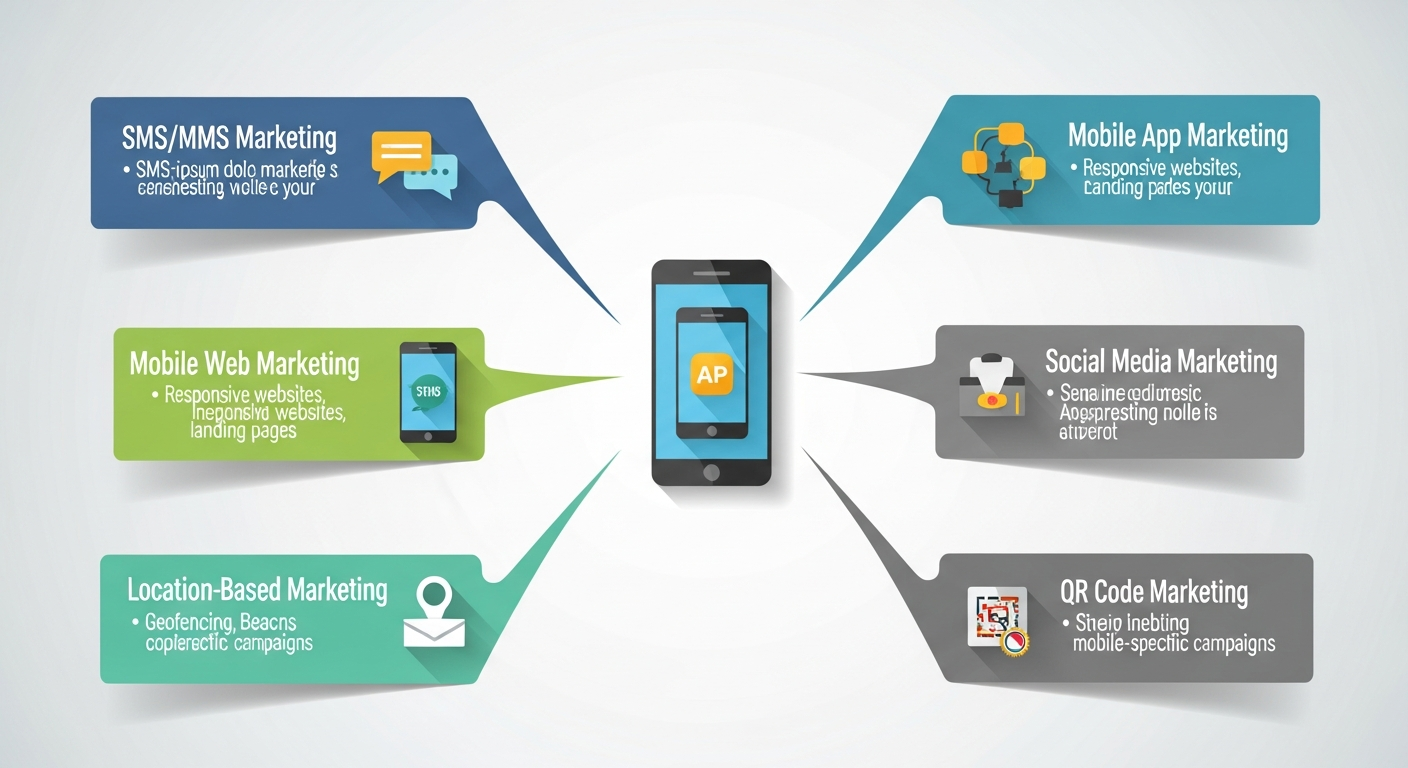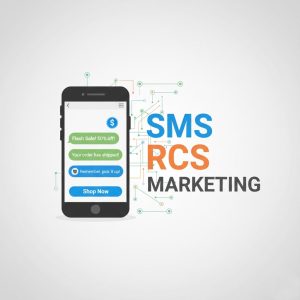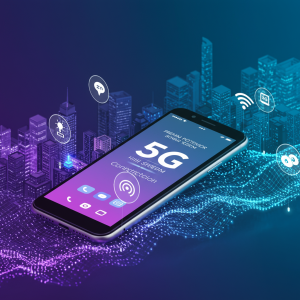Mobile Marketing Platforms: Your Complete Guide to Success

Mobile marketing platforms enable businesses to engage consumers via smartphones and tablets through push notifications, SMS, in-app messaging, and location-based campaigns. They offer analytics, personalization, and real-time optimization. Choosing the right platform, defining clear goals, segmenting audiences, and measuring performance ensures effective, ROI-driven mobile marketing in a mobile-first world.
Mobile devices have become the central channel through which consumers discover, evaluate, and engage with brands. With more than 6.8 billion smartphone users worldwide, the majority of customer interactions now occur on mobile platforms, from browsing websites and social media to making purchases and interacting with apps. Businesses that fail to adopt mobile marketing risk missing out on critical opportunities to connect with their audience, resulting in lost market share and reduced brand relevance. Mobile marketing platforms provide comprehensive tools and capabilities that enable companies to reach customers efficiently on their preferred devices, deliver personalized experiences, and optimize campaigns in real time for maximum engagement and conversions. By leveraging these platforms, brands can ensure they stay visible, relevant, and competitive in an increasingly mobile-first world.
What Are Mobile Marketing Platforms?

Mobile marketing platforms are comprehensive software solutions designed to help businesses create, manage, and optimize marketing campaigns specifically for mobile devices. These platforms integrate various marketing channels and tools into a unified system, enabling marketers to deliver personalized experiences across smartphones and tablets.
Unlike traditional marketing tools, mobile marketing platforms are specifically designed to address the distinctive behaviors and preferences of mobile users. Mobile audiences often have shorter attention spans, engage with content on-the-go, and respond more effectively to visually appealing and interactive messaging. Additionally, mobile users exhibit location-based behaviors that allow brands to deliver timely and contextually relevant offers. To cater to these patterns, mobile marketing platforms provide a variety of features, including push notifications that can be personalized based on user actions, in-app messaging that reaches users while they are actively engaged with your app, SMS and MMS marketing with high open and engagement rates, and mobile-optimized email campaigns that ensure readability and impact on smaller screens. By leveraging these mobile-focused tools, businesses can create more relevant, engaging, and immediate interactions with their customers, improving both engagement and conversion rates.
Core Features of Mobile Marketing Platforms
Push Notifications
Push notifications remain one of the most effective mobile marketing tools. Modern platforms offer sophisticated targeting options, allowing you to send personalized messages based on user behavior, location, and preferences. Advanced platforms provide A/B testing capabilities to optimize message performance and timing.
In-App Messaging
For businesses with mobile apps, in-app messaging creates seamless communication opportunities. These messages appear while users actively engage with your app, making them highly relevant and timely. Features include rich media support, interactive elements, and behavioral triggers.
SMS and MMS Marketing
Text messaging maintains impressive open rates of 98%, making it invaluable for time-sensitive communications. Mobile marketing platforms integrate SMS campaigns with other channels, enabling coordinated multi-channel campaigns that reinforce your message across touchpoints.
Location-Based Marketing
GPS capabilities allow platforms to deliver location-specific content and offers. This feature proves particularly valuable for retail businesses, restaurants, and service providers who want to target customers near physical locations.
Analytics and Attribution
Comprehensive analytics track user journeys across channels, providing insights into campaign performance and customer behavior. Advanced platforms offer predictive analytics and customer lifetime value calculations to inform strategic decisions.
Benefits of Using Mobile Marketing Platforms
Increased Customer Engagement
Mobile marketing platforms enable direct, personal communication with customers. Push notifications achieve average click-through rates of 7.8%—significantly higher than email marketing. This direct access helps maintain brand awareness and encourages repeat interactions.
Enhanced Personalization
These platforms collect and analyze user data to create highly personalized experiences. Machine learning algorithms identify patterns in customer behavior, enabling automated campaigns that deliver relevant content at optimal times.
Improved ROI
Mobile marketing consistently delivers strong returns on investment. SMS marketing, for example, generates an average ROI of $36 for every dollar spent. The combination of high engagement rates and precise targeting maximizes campaign effectiveness.
Real-Time Campaign Optimization
Mobile platforms provide instant performance data, allowing marketers to adjust campaigns in real-time. This agility ensures optimal resource allocation and prevents wasted spend on underperforming messages.
Types of Mobile Marketing Platforms

All-in-One Solutions
Comprehensive platforms like Salesforce Marketing Cloud and HubSpot offer complete marketing ecosystems. These solutions integrate mobile capabilities with email marketing, social media management, and customer relationship management tools.
Specialized Mobile Platforms
Dedicated mobile marketing platforms such as Airship and Braze focus exclusively on mobile engagement. They typically offer more advanced mobile-specific features and deeper integration with mobile app ecosystems.
Enterprise Solutions
Large organizations often require enterprise-grade platforms with advanced security, compliance features, and extensive customization options. These solutions support complex organizational structures and high-volume campaigns.
Key Considerations When Choosing a Platform
Integration Capabilities
Evaluate how well the platform integrates with your existing marketing technology stack. Seamless data flow between systems ensures consistent customer experiences and prevents data silos that hamper personalization efforts.
Scalability
Consider your future growth plans when selecting a platform. The solution should accommodate increasing user bases, campaign volumes, and feature requirements without significant performance degradation.
Compliance and Security
Mobile marketing involves sensitive customer data, making security and compliance critical factors. Ensure the platform meets relevant regulations like GDPR, CCPA, and industry-specific requirements.
Pricing Structure
Mobile marketing platforms use various pricing models—per message, per user, or subscription-based. Calculate total cost of ownership including setup fees, overage charges, and additional feature costs.
Implementation Best Practices
Start with Clear Objectives
Define specific, measurable goals before implementing any mobile marketing platform. Whether you aim to increase app downloads, boost in-store visits, or improve customer retention, clear objectives guide platform selection and campaign development.
Segment Your Audience
Effective mobile marketing relies on audience segmentation. Create detailed customer segments based on demographics, behavior, preferences, and lifecycle stage. This segmentation enables highly targeted campaigns that resonate with specific audience groups.
Optimize Message Timing
Mobile users exhibit distinct usage patterns throughout the day. Analyze your audience data to identify optimal sending times for different message types. Consider time zones for global audiences and avoid sending messages during likely sleep hours.
Create Compelling Content
Mobile screens offer limited space, requiring concise, impactful messaging. Focus on clear value propositions and strong calls-to-action. Use rich media strategically to enhance engagement without overwhelming the user experience.
Measuring Success
Key Performance Indicators
Track metrics aligned with your business objectives. Common KPIs include click-through rates, conversion rates, app installs, customer lifetime value, and return on ad spend. Establish baseline measurements to accurately assess improvement over time.
Attribution Modeling
Mobile customer journeys often span multiple touchpoints and devices. Implement robust attribution models to understand how mobile marketing contributes to conversions and business outcomes.
Continuous Testing
Regularly test different message formats, sending times, audience segments, and call-to-action buttons. A/B testing provides data-driven insights that improve campaign performance over time.
Common Challenges and Solutions

Message Fatigue
Excessive messaging can lead to app uninstalls and opt-outs. Implement frequency capping and preference centers that allow users to control message types and frequency.
Privacy Concerns
Growing privacy awareness requires transparent data collection practices. Clearly communicate how you use customer data and provide easy opt-out mechanisms to maintain trust and comply with regulations.
Technical Integration
Complex integrations can delay implementation and create ongoing maintenance challenges. Work with experienced implementation partners and thoroughly test integrations before launching campaigns.
Future Trends in Mobile Marketing
Artificial Intelligence Integration
AI-powered mobile marketing platforms are transforming how businesses engage with customers by automating key processes such as campaign optimization, content creation, and audience segmentation. Machine learning algorithms analyze vast amounts of behavioral, demographic, and transactional data to predict customer preferences and purchase intent. This enables platforms to deliver personalized content and recommendations at the right moment, automatically adjusting campaigns in real-time for maximum effectiveness. As AI technology evolves, marketers can expect even more sophisticated predictive capabilities, including sentiment analysis, dynamic content generation, and automated multivariate testing, making campaigns increasingly efficient and highly targeted.
Cross-Device Coordination
Modern consumers interact with brands across multiple devices—smartphones, tablets, laptops, and smartwatches—creating complex, multi-touch journeys. Mobile marketing platforms are evolving to offer cross-device tracking and coordination, allowing marketers to deliver seamless experiences regardless of the device being used. By linking user behavior across platforms, marketers gain a holistic understanding of the customer journey, which supports personalized messaging, consistent branding, and timely interventions. Enhanced cross-device capabilities also help reduce redundancy in communication, improve attribution accuracy, and optimize budget allocation for campaigns spanning multiple devices.
Privacy-First Marketing
With increasing consumer awareness and stricter regulations like GDPR and CCPA, mobile marketing platforms are shifting toward privacy-preserving strategies. First-party data collection, cookieless tracking solutions, and transparent consent mechanisms are becoming standard practices. Businesses are focusing on building trust by giving users control over their data while still delivering personalized, relevant content. Privacy-first marketing not only ensures regulatory compliance but also enhances brand credibility, strengthens customer relationships, and enables sustainable long-term engagement in a digital landscape where privacy is a key consumer concern.
Transform Your Mobile Marketing Strategy
Mobile marketing platforms represent essential infrastructure for modern businesses seeking to engage customers effectively. These platforms provide the foundation for creating personalized, timely, and highly relevant interactions with audiences who increasingly rely on mobile devices for information, shopping, and communication. The combination of direct communication channels, sophisticated targeting capabilities, and real-time optimization tools creates unprecedented opportunities for customer engagement and business growth, allowing businesses to reach the right people with the right message at the right moment.
Success requires careful platform selection, strategic implementation, and ongoing optimization based on performance data. Choosing the right platform involves evaluating features, integration capabilities, scalability, security compliance, and pricing structures to ensure alignment with both current operations and long-term growth objectives. Strategic implementation includes setting clear goals, segmenting audiences effectively, crafting compelling content, and timing campaigns to maximize engagement. Ongoing optimization relies on tracking key performance indicators, analyzing results, and refining campaigns continuously to maintain relevance and effectiveness.
Start by clearly defining your objectives, understanding your audience, and selecting a platform that aligns with your current needs and future growth plans. Understanding the target audience includes analyzing demographics, behavioral patterns, device preferences, and mobile usage habits to tailor messaging and campaign strategies. Defining objectives may involve increasing app downloads, boosting customer retention, driving in-store visits, or improving overall brand engagement. A thoughtful approach to platform selection ensures that campaigns are scalable, integrated with existing marketing systems, and capable of delivering actionable insights.
The mobile marketing landscape continues evolving rapidly, with new technologies and capabilities emerging regularly. Innovations such as artificial intelligence for predictive analytics, cross-device tracking, location-based marketing, rich media messaging, and privacy-first solutions are reshaping how businesses engage mobile users. Companies that embrace these platforms now position themselves for sustained success in an increasingly mobile-first world, gaining competitive advantage by delivering highly personalized experiences, optimizing campaign performance in real-time, and maintaining meaningful connections with customers across all touchpoints.
By leveraging the full potential of mobile marketing platforms, businesses can not only improve engagement and conversions but also build long-term loyalty and drive measurable growth in an ever-connected, mobile-centric marketplace.
Conclusion:
Mobile marketing platforms are essential for businesses targeting the growing mobile user base. They provide tools for personalized communication, analytics-driven optimization, and multi-channel integration. Successful mobile marketing depends on strategic platform selection, audience segmentation, compelling messaging, and continuous testing. Embracing these platforms positions businesses for long-term growth in a mobile-first landscape.
FAQ:
Q1: What is a mobile marketing platform?
A mobile marketing platform is software that helps businesses create, manage, and optimize marketing campaigns specifically for mobile devices, integrating channels like push notifications, SMS, in-app messaging, and mobile email.
Q2: Why is mobile marketing important?
With billions of smartphone users globally, mobile marketing reaches audiences where they spend most of their time, offering high engagement, personalization, and strong ROI compared to traditional channels.
Q3: What features do mobile marketing platforms offer?
Common features include push notifications, in-app messaging, SMS/MMS marketing, location-based targeting, analytics, A/B testing, automation, and cross-device tracking.
Q4: How do I choose the right platform?
Consider integration capabilities, scalability, security and compliance, pricing, and alignment with your business goals and growth plans.
Q5: How can success be measured?
Track KPIs such as click-through rates, conversion rates, app installs, customer lifetime value, ROI, and engagement metrics. Use attribution models and continuous A/B testing for optimization.





